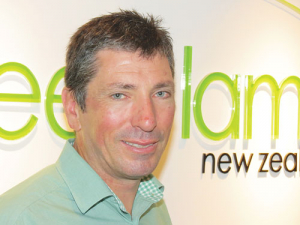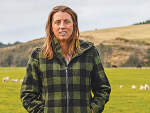Environmental management, its use and regulation is high on the radar of sheep and beef farmers, according Beef+Lamb NZ’s Sam McIvor.
In his keynote address to BLNZ’s environment conference, last week, McIvor told delegates that soil, water and vegetation is the ‘basis of their industry and they know and understand these assets – because they are basis of their livelihood’. He noted that careful management of the environment is essential to the success of their businesses and farmers understand their obligation to the land.
McIvor says sheep and beef farmers are better able to understand these issues now that impacts are being measured, but there is still some confusion in this regard.
“There is no shortage of willingness to invest in time and money in things. It’s really the confidence that what they do will have a positive impact and I guess the jury on this is still out for a lot of farmers,” he told the conference.
“They say if they fence off a stream or retire land, will it really improve the water quality? They ask if they drop their fertiliser rates back, what’s the impact?
“These are investment decisions for farmers and they want to be confident that what they do will achieve the right outcome.”
McIvor says farmers accept that some of our water ways have issues with nitrogen, phosphate, bacterial contamination, sediment and other stuff, and that farming a part to play. “They accept too that the concern is widespread, that includes the farming sector, rural communities, the wider NZ population and many customers overseas and increasingly trading partners or competitors.
“Let me also say that as a sheep and beef sector – we also get that.”
But McIvor adds that people in the wider community should also be aware that what farmers do provides a whole raft of jobs in the community. He says farmers are rightly intolerant of individuals who spout off opinion without the facts to back it up.
“Contrary to some reports, sheep and beef farmers haven’t been sitting on their hands in regards to environmental issues.”
He points to huge changes the industry has made in the last 30 years by producing the same about of lamb meat, while at the same time the national flock has dropped from 70 million to less than 30 million. In that period, greenhouse gas emissions from sheep and beef farms have fallen by 19%.
“We produce high quality food, in low-impact farming systems on land with few alternatives. A world that needs to mitigate environmental impact, and yet feed 9 billion people by 2050, needs sectors like ours.”
McIvor says farmers are happy to improve their environmental management, but there are some roadblocks to this.
“Such things as a lack of clarity on national environmental issues, making national environmental objectives relevant to farmers and making sure that the whole community and not just farmers are targeted.”
He also points out that there needs to be greater consistency with regional council plans, which adds confusion to the mix.
People have to understand that ‘environmental requests’ are seen as ‘compliance’ by farmers.
“Environmental sustainability is not just a farmer issue – it is a community issue, not just a rural community issue, but an urban one too.
“The community needs to understand the consequences of the questions they are asking of farmers, and the conversation needs to consider all perspectives and focus on what we can agree on to progress,” McIvor says.



















